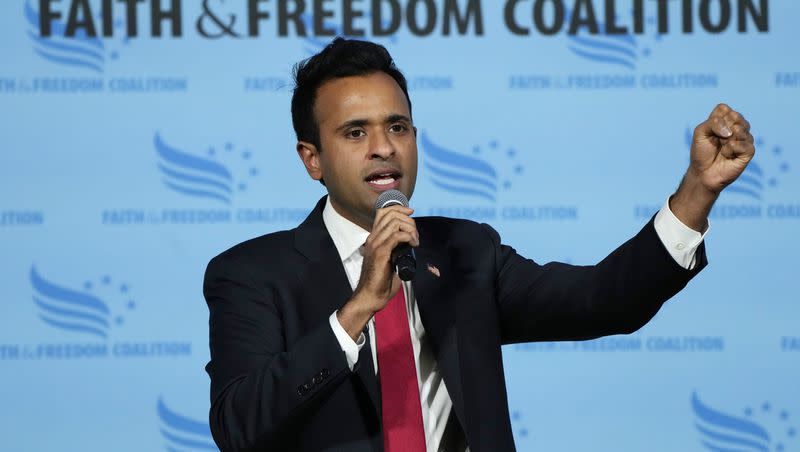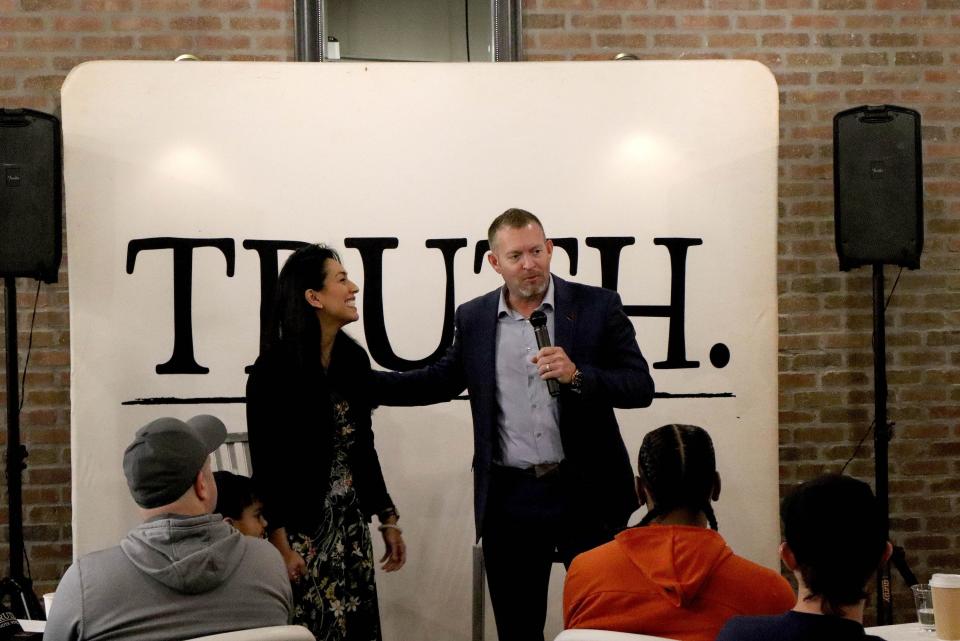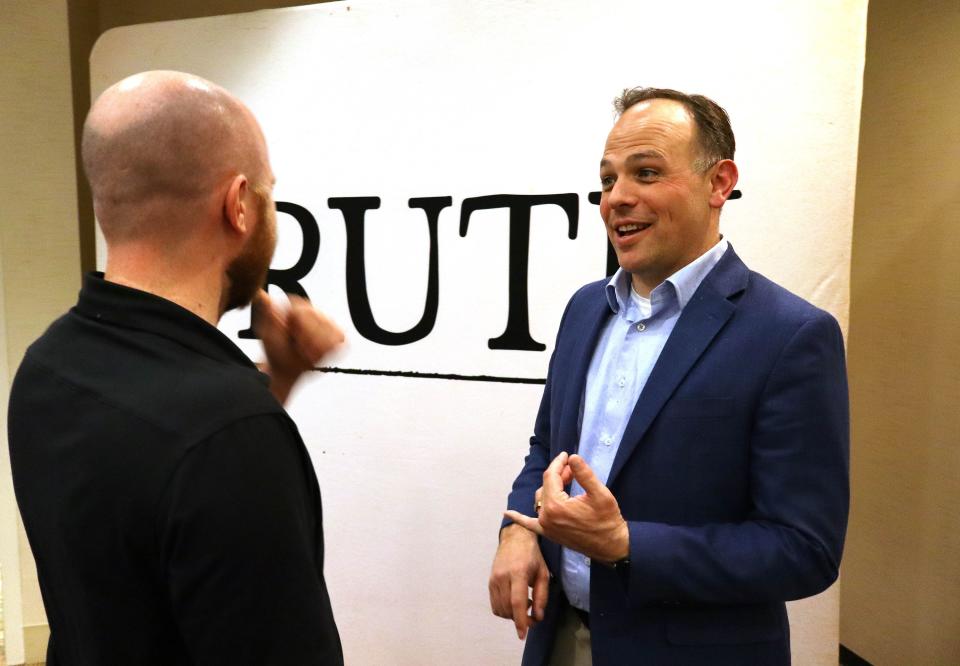Vivek Ramaswamy needs to win over Iowa evangelicals. He hired 2 former Latter-day Saint missionaries to help

- Oops!Something went wrong.Please try again later.
Last week, in a hotel conference room in Council Bluffs, Iowa, Vivek Ramaswamy fielded a barrage of questions from the Republican state party chairman. One question dealt with China. Another, about Iran. Then the chair, Jeff Kaufmann, hesitated. He framed his next question diplomatically — “you can delve personally, policy-wise, any way you want to go with this,” he said. Ramaswamy, sitting across from him, held a microphone to his mouth, anticipating.
“Could you talk about the role of faith in a Vivek Ramaswamy administration?”
The room went silent, all eyes on Ramaswamy. The 38-year-old presidential candidate smiled. “We’ve had a lot of discussion on policy, but I always feel like there’s a little bit of an elephant in the room when we leave at times,” he said. “I’m Hindu. I’d be the first Hindu president that we’ve had in the United States.”
Then Ramaswamy began to elaborate. He went on for five minutes, uninterrupted, about his belief in one true God, in the purpose of life, in the sanctity of marriage. He quoted the Old Testament, crediting the Bible study courses he took at his Catholic high school in Cincinnati. “I think that’s the value set that our nation was founded on. We share that, deeply, in common,” he said.
By the time he finished, the tension in the room seemed to dissipate. Attendees nodded along as he spoke and thanked him when he finished.
Sitting at the front of the room, just below the stage, was Jake Chapman, one of Ramaswamy’s campaign co-chairs in Iowa. Chapman deserves as much credit as anyone in helping Ramaswamy craft his message on religion in a way that evangelical Christians — who make up a majority of likely Iowa Republican caucusgoers — will embrace.

The former Iowa Senate president, Chapman understands Ramaswamy’s challenge, in a way: Chapman grew up a member of The Church of Jesus Christ of Latter-day Saints and served a mission to Norway. When he ran for the state senate in Iowa, he was a practicing Latter-day Saint, and he faced his fair share of skepticism from wary evangelicals. (Latter-day Saints, like Hindus, make up less than 1% of the Iowa adult population.)
“Safe to say that there were a lot of questions raised when I first ran for office,” Chapman told me. “There were probably some that wouldn’t vote for me for that reason.”
Now, Chapman is tasked, in part, with helping the first-ever Hindu Republican presidential candidate to connect with evangelicals. In recent years, Chapman converted to evangelicalism and married an evangelical Christian, so he now has something of an insider’s view; the other campaign co-chair, Matt Schultz, is still a practicing Latter-day Saint. Both campaigned for Mitt Romney when he ran for president — Schultz in 2008, Chapman in 2012.
“I think it brings people to at least feel a peace that he can be Hindu, and I can be Mormon and somebody else can be Catholic or evangelical, but that he’ll fight for those core values that we all believe,” Schultz, the former Iowa secretary of state, said.
Over the past few weeks, there appears to be a marked shift in Ramaswamy’s openness about his faith. At the event in Council Bluffs on Nov. 16, he spent a good chunk of the event answering two separate questions about his personal religiosity; the following day, in front of a room full of evangelicals at the Thanksgiving Family Forum, Ramaswamy repeated the message.
“My faith teaches me that we have a duty, a moral duty, to realize that purpose, that we’re God’s instruments,” he said. “He works through us in different ways, but we are still equal because God resides in each of us.”
Schultz and Chapman deny there’s been any shift in Ramaswamy’s strategy, just that voters have started asking more. But they both admitted that Iowans — widely known as “Iowa nice” — have been extremely hesitant for months to pry about Ramaswamy’s faith. Often, event attendees will approach Ramaswamy’s staff at town halls, asking them about the “Hindu thing.” More often than not, Chapman said, voters seemed scared that asking Ramaswamy directly about his faith will come across as an act of hostility. “You don’t want to be labeled as a religious bigot,” Chapman said. “You don’t want to have that label placed on you.”
But there’s no way around it. In order to win Iowa, candidates need to win the evangelical vote. A majority of Republican voters there are evangelicals; in 2016, the last time there was a competitive caucus in Iowa, evangelicals made up 64% of Republican voters who showed up.
Polls show that evangelicals are skeptical of Ramaswamy’s faith, more so than voters of other faiths. A Deseret News/HarrisX poll in September asked voters nationwide whether Ramaswamy’s religious beliefs made them more likely to vote for him, less likely or no difference. Evangelicals were similar to survey respondents at large; 19% said they were less likely to vote for him because of his faith, compared to 18% of voters generally. 23% of evangelicals said they were more likely to support him, even higher than 17% of voters at large.
Later, when voters were explicitly told “Vivek Ramaswamy identifies as a Hindu” then asked the same question about his religious affiliation, 25% of evangelicals said they were less likely to vote for him and only 12% said they were more likely — a significant shift from the earlier question.

It’s not the first time a Republican candidate from a minority faith has struggled to win over Iowa evangelicals. In 2016, Marco Rubio’s Catholicism and upbringing as a Latter-Day Saint were a “poison pill” to some Iowans. And Mitt Romney, a devout Latter-day Saint, outspent the other candidates by a mile in 2008, pouring $10 million into Iowa only to finish second. Four years later, he again finished as runner-up. Romney’s faith was the key hindrance to many voters.
Schultz saw some of the dissonance firsthand. After attending BYU-Idaho and serving a Latter-day Saint mission to Argentina, Schultz moved back to Iowa, where he worked as a volunteer on the 2008 Romney campaign. (Schultz didn’t work for Romney in 2012, instead backing Rick Santorum.) In 2010, Schultz ran for secretary of state in Iowa. Thanks to Romney, “people here had heard about Mormons before I ran,” he said.
Still, he faced plenty of questions — especially whether Latter-day Saints believe in Jesus and follow the Bible. “Were there people who didn’t vote for me because of (my faith)? I’m sure there were,” Schultz said. “But honestly, I felt like most people gave me an honest shake.”

Chapman dealt with anti-Latter-day Saint hostility, too. He campaigned for Romney in 2012, winning his own election for the state senate that year. During one floor debate in 2017, a fellow state senator poked fun at Chapman’s faith. While Chapman was reading from a book to answer a question about firework restrictions, a Democratic senator sarcastically asked Chapman to “dumb this down” because he didn’t “have the Book of Mormon over there like you’ve got to read from.” The incident made waves across the state’s political landscape; the state Republican Party chairman called the statement “bigoted.”
In a way, Schultz and Chapman understand the hesitance some voters feel about Ramaswamy’s minority faith; they’ve experienced that wariness themselves. They say they don’t tell Ramaswamy what to say to evangelicals, but they do encourage him to talk more about his personal faith. More Iowans are asking, they note.
“I think they’re fair questions, and I know that Vivek thinks they’re fair questions,” Chapman said. Ramaswamy’s go-to answer focuses on his belief in God, in the purpose of each life, and in the moral imperative of each human finding that purpose. “I’ve watched (voters’) faces,” Schultz said. “They’re nodding in agreement with most of what he’s saying.”
Many of the attendees at Ramaswamy’s Council Bluffs event were no different. Dylan Hoyt, a middle-aged man who drove nearly two hours to attend, said he has “no problem” with Ramaswamy’s faith. “I think it’s admirable for anyone to follow faith these days,” Hoyt said. “There’s a lot of similarities between Christianity and Hinduism.” Hoyt plans to support Ramaswamy in the caucus.
Not everyone sees it the same way. Rebecca Wilkerson, also an evangelical Christian, said “most” of her friends are cautious about Ramaswamy’s faith. “I talked to a guy today,” she told me. “He said, ‘I absolutely will not vote for a Hindu.”
When I asked what she thought, she shook her head. “(Ramaswamy) has the same core values that we have.” she said. “I’m not electing a pastor.”

